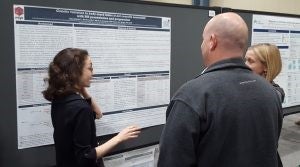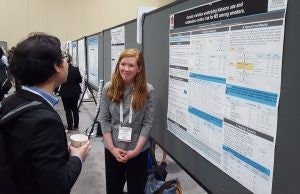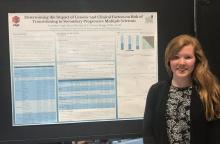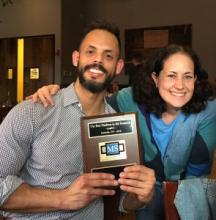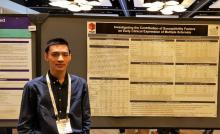View more information on research.
5/2021: Dr. Briggs was awarded $1.2 million over three years from the National Institute of Neurological Disorders and Stroke (NINDS) at the National Institutes of Health to identify biomarkers to improve the diagnoses of multiple sclerosis (MS), including the ability to monitor disease activity and progression. Read more.
3/23/2021: Dr. Briggs and Dr. Davis, of Brigham Young University, published their work discriminating MS patients from non-MS patients using hematological profiles and machine learning (random forest); the most predictive measures were increased bilirubin and creatinine in MS. Their paper can be found here.
3/19/2021: Dr. Briggs and colleagues at MetroHealth (Dr. Gunzler), Cleveland Clinic (Drs. Conway and Ontaneda), and Texas State (Dr. De Nadai) published a latent profile analysis of relapsing remitting MS patients based on three patient-reported outcomes and two timed tasks. The machine learning approach discerned there were 6 subgroups of MS patients with similar impairment patterns across measures, and demonstrates substantial promise for advancing clinical profile in MS. The analysis can be found here.
3/18/2021: Dr. Briggs and colleagues published a short report in Multiple Sclerosis Journal demonstrating no difference in the age of hypertension onset in those with/at risk for MS compared to those without MS using >130,000 electronic health records from the Cleveland Clinic.
3/3/2021: Another lab paper came out in early March. Corri Sept and Dr. Briggs published their machine learning analysis (association rule mining) of established MS genetic risk factors. They demonstrated evidence for higher-order interactions amongst these variants, including a 20-fold (p<5x10-8) increased MS risk in carriers of HLA-DRB1*15:01, SLC30A7-rs56678847 and AC093277.1-rs6880809 risk alleles. The paper can be found here.
2/24/2021: The lab had several posters presentations today at the annual meeting of the Americas Committee for Treatment and Research in Multiple Sclerosis (ACTRIMS). And congratulations to Elina, Alena, Emily, and Claire, who were all recipients of the competitive educational grant award! Elina presented her Mendelian randomization analysis of adiposity traits on MS risk. Alena characterized MS patients burdened with common comorbidities. Emily sought to what factors were associated with poor mental health in those with MS. And lastly, Claire replicated a protective effect for having been breastfed in infancy on MS risk, and observed an increased risk for those exposed to passive smoking in childhood. Claire observed no notable childhood exposure relationships with neuromyelitis optica spectrum disorder (NMOSD) or transverse myelitis (TM) risk.
Elina Misicka's presentation is here.
Alena Sorensen's presentation is here.
Emily Tyszka's presentation is here.
Claire Sonneborn's presentation is here.
12/18/2020: Elina Misicka’s impressive genome-wide investigation of age at onset of MS was posted as a preprint. Her work demonstrated that genetic risk for MS significantly confers an earlier onset of MS, and implicated genes involved in adaptive and innate immunity, specifically complement pathway, and synapses and collagen biosynthesis.
10/28/2020: The lab had poster presentations at the annual meeting of the American Society for Human Genetics. Elina Misicka presented her genome-wide association study of age at onset of MS. Dr. Briggs presented his recently published gene-environment interaction analysis of nicotinic acetylcholine receptors and tobacco smoke in MS.
Elina Misicka's poster is here.
Dr. Brigg's poster is here.
10/21/2020: Dr. Briggs and PQHS colleagues, Drs. Crawford, Bush, and Cooke-Bailey, led a workshop during the annual meeting of the Society for Advancement of Chicanos/Hispanics and Native Americans in Science (SACNAS). Their workshop was titled: "Precisely Precision Medicine: A Primer on Translational Research Talk Title: Electronic health records not your parents paper charts".
10/4/2020. Dr. Briggs collaborated with colleagues at Brigham Young University on a genome-wide association study of depression in MS patients. Their work was published in Multiple Sclerosis and Related Disorders. This also was reported on in the Multiple Sclerosis News Today.
9/27/2020: Dr. Briggs and Dr. Hill (former NDGE trainee) had their research showing a 25% increased prevalence of hypertension in MS patients compared to non-MS patients in the U.S. published in the European Journal of Neurology. This worked was also reported on in Multiple Sclerosis NewsToday. This study is the largest of its kind, using 37 million electronic health records.
9/15/2020: Another NDGE paper is out. Dr. Briggs conducted a gene-environment interaction analysis that implicates genetic variation innicotinic acetylcholine receptors α7 and α9 as modifiers of MS risk conferred by tobacco smoke. Read the paper here.
9/12/202: Dr. Briggs gave an invited presentation on incorporating machine learning to assess MS risk factors during a parallel session at MSVirtual2020, the 8th Joint ACTRIMS-ECTRIMS Meeting. See his presentation here.
9/11/2020: Dr. Briggs and team had three e-poster presentations at MSVirtual2020, the 8th Joint ACTRIMS-ECTRIMS Meeting. Corri Sept presented a novel application of a machine-learning algorithm to identify higher-order genetic interactions contributing to MS risk. See her presentation here.
Elina Misicka presented on a Mendelian randomization investigating suggesting no causal associations for hypertension, hyperlipidemia, or diabetes on MS risk. See her presentation here.
And lastly, Dr. Briggs presented findings from a matched double cohort study demonstrating that the age of onset of hypertension is earlier in those at risk for MS. See his presentation here.
7/10/2020: Dr. Briggs and colleagues had a correspondence published in the New England Journal of Medicine advocating for epidemiologic rigor in Covid-19 publications. Read their correspondence here.
5/18/2020: Frances Wang's first first-author publication is out in the Multiple Sclerosis Journal. Read the publication here. The study integrated genetic and non-genetic predictors to inform depression risk stratification after MS onset. A notable finding was that APOE ε4/ε4 and ε2/x conferred increased and decreased depression risk, respectively.
5/17/2020: Eddie Hill (M.D.) - Now Dr. Hill - and Corri Sept (B.S.) both graduated with high honors! Eddie is off to his No. 1 choice for residency in San Diego and Corri is off to Harvard for graduate school! Well Done!
4/24/2020: Elina Misicka’s (PhD) first first-author publication, and Corri Sept’s first publication, was published in the Journal of Neurology. Read their paper here. This publication presented prediction models for risk of secondary progressive (SP) MS using genetic and non-genetic information that would be measurable near the onset of relapsing-remitting MS. It is the first study to investigate the impact of MS genetic risk factors on risk of SPMS, and we demonstrated that HLA-A*02:01, which reduces the risk for MS also reduced the risk of SPMS.
2/28/2020: Neurology Advisor reported on Dr. Briggs’ research with colleagues at the Cleveland Clinic (Dr. Devon Conway) and Point Park University (Dr. Diane Krill), regarding the age of onset of hyperlipidemia in those with MS. Read about their research here. This was presented at the Americas Committee for Treatment and Research in Multiple Sclerosis early that day.
2/27/2020: The team presented two posters at the Americas Committee for Treatment and Research in Multiple Sclerosis (ACTRIMS) Forum 2020 in West Palm Beach.
Elina Misicka and Corri Sept were recipients of the Educational Travel Award and presented their posters on a Mendelian randomization analysis of obesity on MS phenotypes and a Gene x Environment (smoking) investigation of MS risk, respectively.
2/24/2020: Dr. Briggs collaborated with Dr. Martha Sajatovic, to identify potential mediators of a remotely delivered self-management program on improving outcomes in vulnerable people with epilepsy. Their work was published in the journal of Epilepsy Research. Read their publication here.
12/10/2019: Dr. Briggs gave a seminar on “Characterizing the genetic and non-genetic components of the multiple sclerosis phenotype” as part of the Neuroimmunology Seminar Series in the Department of Neurology at John Hopkins University School of Medicine.
12/8/2019: Dr. Briggs presented a research poster at the American Epilepsy Society’s Annual Meeting in Baltimore, MD. The findings of the causal mediation analysis demonstrated that improvements in depression and quality of life mediated a portion of the effect of a self-management intervention for improved outcomes in persons living with epilepsy.
10/24/2019: Elina Misicka presented at the Biomedical Graduate Student Symposium here at CWRU. She shared findings from a Mendelian randomization analysis of the causal genetic relationships between body mass index and multiple sclerosis risk and presentation.
10/18/2019: Dr. Briggs presented on behalf of colleagues at Brighman Young University and Biogen, results from a large genetic study of age of onset of multiple sclerosis during the poster session at the annual meeting for The American Society of Human Genetics held in Houston, TX.
09/27/2019: Today in Science, Dr. Briggs wrote a commentary on two recent large genetic studies of multiple sclerosis (MS) risk conducted by the International MS Genetics Consortium.
09/09/2019: Dr. Briggs gave an invited presentation on things to consider before returning sequence level genetic data to research participants at the North Coast Conference on Precision Medicine.
07/24/2019: Today another lab paper was published. Dr. Briggs and Eddie estimated that there are >800,000 Americans living with MS using 56.6 million electronic health records and US census data. The findings support early-2019 studies of administrative health claims data. These estimate near double the pre-2019 MS prevalence.
06/03/2019: Dr. Briggs and fellow PQHS faculty members, Drs. Crawford and Cooke-Bailey, had a review article published in Human Genetics. In this review, they summarized the resources required to receive, process, and interpret return of large-scale genetic/genomic research results to study participants, and highlighted the potential for access disparities and warned the scientific community to mind the gap so that all participants have equal access and understanding of the benefits of human genetic research.
05/09/2019: Dr. Briggs presented at the 71st Annual Meeting of the American Academy of Neurology. His presentation was titled Multiple sclerosis genetic risk burden confers earlier onset, and part of the MS Epidemiology and Risk Stratification session.
05/02/2019: Dr. Briggs and Dr. Milena Gianfranceso had a commentary on obesity and pediatric multiple sclerosis published in Developmental Medicine & Child Neurology.
04/19/2019: Corri presented her work at CWRU’s 2019 Intersections. Corri conducted a series of survival analyses investigating the role of multiple sclerosis genetic and non-genetic risk factors on disease progression.
03/14/2019: Another NDGE paper is out, this was work in close collaboration with our colleagues at the Duke Center for Research in Autoimmunity and Multiple Sclerosis (DREAMS). This project was a comprehensive metabolomic profiling of men with and without MS. Genetic and genomic data were available to guide interpretations.
03/08/2019: Medscape Medical News reported on Eddie’s publication on asthma in MS.
03/06/2019: The team presented 5 posters at Americas Committee for Treatment and Research in Multiple Sclerosis (ACTRIMS) Forum 2019 in Dallas. Elina, Frances and Eddie were all recipients of the Educational Travel Award and we able to present their posters! Jordan’s and Blaine’s projects were incorporated into two additional NDGE posters.
02/05/2019: Another lab paper out today on Eddie’s work on asthma in MS.
02/01/2019: Today another paper was published. This study assessed the impact of MS risk factors on MS presentation near onset and built on Justin’s work from 2017-2018. Of note, MS genetic risk was associated with early age of onset. Parts of this work was supported by the National Multiple Sclerosis Society (PP-1703-27359).
01/29/2019: Today the lab’s paper on factors influencing walking impairment, dexterity, and perceived disability was published. In brief, higher body mass index, smoking, lower socio-economic status, and being on Medicare/Medicaid were also were poorer outcomes.
01/29/2019: Dr. Briggs was a guest on RealTalk MS podcast. Episode 75 (January 2019). “MS Risk Factors”
12/17/2018: MS News today reported on a lab’s forthcoming publication: “Each Major Risk Factor (Like Genes, Smoking and Obesity) Can Affect Disease Course, Study Finds”
12/14/2018: Dr. Briggs gave a seminar at the Center for Health Care Research and Policy (CHRP) on phenotypic heterogeneity in MS.
12/03/2018: Elina presented in the PQHS 501 seminar on her work investigating factors influencing transition from relapsing remitting MS to secondary progressive MS.
9/20/2018: Eddie presented a poster on his asthma in MS project at the SOM’s Lepow Day.
06/01/2018: Dr. Briggs was awarded Best Platform in MS Research at the 2018 Consortium of Multiple Sclerosis Centers (CMSC) Annual Meeting in Nashville. He presented on the impact of obesity on the clinical presentation of MS at onset.
04/25/2018: Dr. Briggs and colleagues from the Cleveland Clinic presented a poster on prognostic factors of disability and depression in patients with MS at the American Academy of Neurology 2018 Annual Meeting in Los Angeles.
02/1/2018: The team presented 3 posters at Americas Committee for Treatment and Research in Multiple Sclerosis (ACTRIMS) Forum 2018 in San Diego. Jinghong was a finalist and Justin was a semifinalist for Best Trainee Poster and we recipients of the Education Travel Award.


